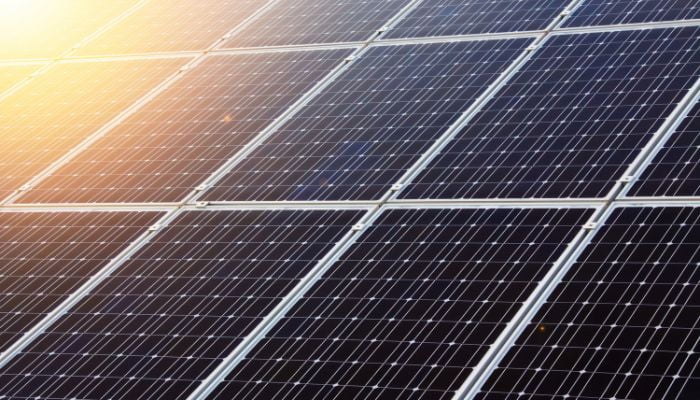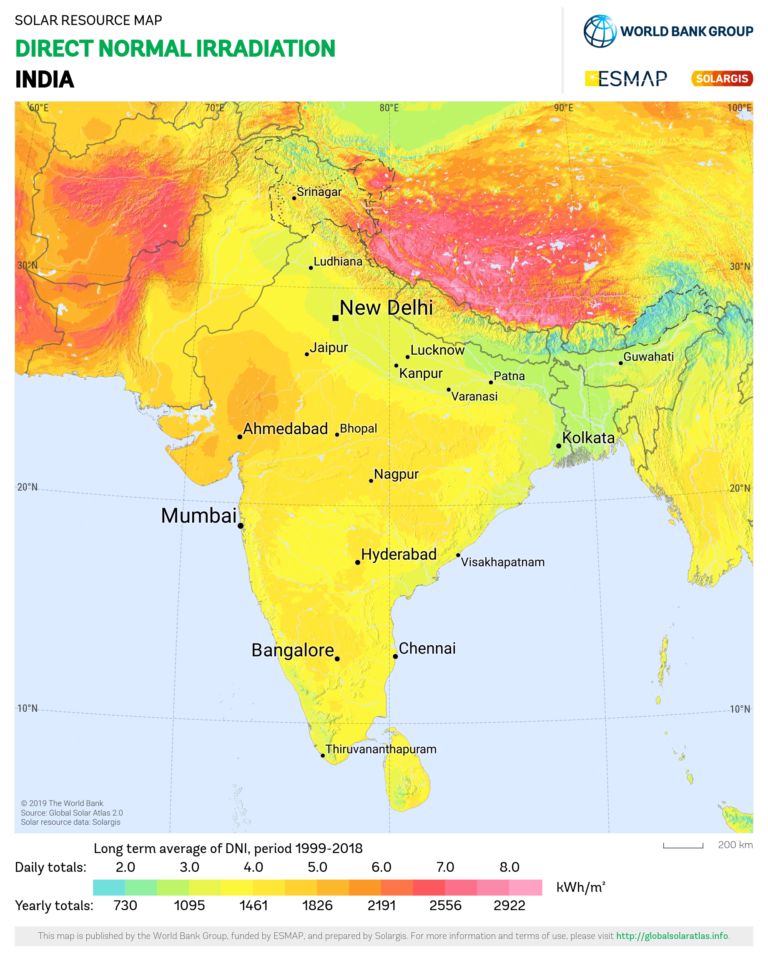
Renewablenation2 Months Ago028 Mins
How much Money Can I save using Solar Power ?
- Considering A domestic Solar On grid System in Bangalore. A 3kW solar Panel could cost you anywhere between Rs. 1,35,000 to 1,65,000 after subsidy.
- A 3kW Solar Panel could save around Rs. 24000 – 30,000 annually.
- A tentative pay pack period of 5-8 years.
Connect to know capacity for your home
Name
Whatsapp Number *
Location (City & Country)
How Soon are you looking to Install Solar Plant? *
Monthly / Bi-Monthly Electricity Bill *
Shall We connect you with our Affiliate Installers?
- Yes
- No
Submit
Enquire Solar Installation Rates in Your City
Solar Panel Price in Bangalore, Karnataka, India
Karnataka is blessed with solar power radiation across its length and breadth. Karnataka has the potential of generating 5.4 to 6.4 kWh of Solar energy per kW of Solar Panel Installed. India on an average has a Majority area which can produce solar power in the range of 4.5-5.5 kWh/kW.
Karnataka is a state in southwest India with Arabian Sea coastlines and Karnataka is rich in solar resources and solar energy in fact complements the conventional sources of energy in a large way. The average temperature across Karnataka ranges from 28 – 34 degC. It is observed that from the end of January till early end of August there is a good amount of sunlight and from October to December it is the monsoons and the peak summer season falls in March to June.
Average Sunny Hours in Karnataka
Karnataka holds over 2461 hours of Sunny in a year which is around 13% lesser than the Country’s average annual sunny hours of 2600 hours. With Annual Average peak sun hours of 6:44 hours daily in Bangalore.
Annual Average Sunny Hours in Southern States of India
- Tamil Nadu : 2762
- Telangana : 2730
- Lakshadweep : 2665
- Andaman & Nicobar : 2196
- Tamil Nadu : 2344
- Gujarat : 3020
- Rajasthan : 2780
- Maharashtra : 2584
Ideal Capacity for Solar Panels for Home in Karnataka
An average home in Karnataka would need around 8-15 units daily. This accounts to around 2 – 5kW of Solar Panels.
| Entity | Power(watts) | Time used (hours) | Quantity | Total Energy Consumed (kWh) |
| Ceiling Fan | 80 | 12 | 2 | 1.92 |
| LED TV 32 inch | 60 | 4 | 1 | 0.24 |
| Tube Light | 20 | 5 | 2 | 0.2 |
| Fridge | 100 | 24 | 1 | 2.4 |
| Washing Machine (1 Ton) | 500 | 2 | 1 | 1 |
| Air Conditioner | 800 | 5 | 1 | 4 |
| Mixer / Blender | ||||
| Water Pump | ||||
| Daily Energy Consumption | 9.76 | |||
| Solar Capacity Needed | 2-5kW |
Enquire Solar Installation Rates in Your City
Solar Panel price for Home in Bangalore, Karnataka.
The price of the solar panels for homes in Bangalore, Karnataka India depends on various parameters including the size, Quality of Equipments, location of Installation and so on.
Cost of 1kW Solar Panel system for Home in Bangalore (Tentative)
| Components | Specifications | Quantity | Price |
| Solar Panel | 250 – 280 Wp | 4 | 34,000 – 55,000 |
| Solar Inverter | 1.2kVA – 2kVA | 1 | 17,000 – 32,000 |
| Battery | 150AH | 1 | 13,000 – 27,000 |
| Wiring & Structures | 18,000 – 20,000 | ||
| Total Cost | 82,000 – 1,32,000 |
Cost of 2 kW Solar Panel system for Home in Bangalore
| Components | Specifications | Quantity | Price |
| Solar Panel | 250 – 280 Wp | 8 | 63,000 – 1,04,000 |
| Solar Inverter | 2.5kVA – 3kVA | 1 | 25,000 – 54,000 |
| Battery | 150AH | 2 | 24,000 – 43,000 |
| Wiring & Structures | 32,000 – 39,000 | ||
| Total Cost | 1,48,000 – 2,38,000 |
Note: The Rates are only Tentative and are bound to vary based on Availability, site condition and actual capacity to be installed.
An on grid solar power project without a battery roughly costs between 50,000INR – 75,000INR. This does not include any subsidy. While, an-grid solar power plant with battery and an off-grid solar plant will be 12,000-15,000Rs more than on-grid solar power plant due to additional Battery and control systems needed.
Solar Panel Subsidy in Karnataka for Homes up to 10kW
The development of renewable energy capacity is one of the prime priorities for the Karnataka government. In March 2022, the state government approved the Karnataka Renewable Energy Policy form 2022-27. The subsidy amount varies depending on the capacity of the solar system and the type of consumer.
The Karnataka government does not provide a separate subsidy, but residential consumers installing grid-connected rooftop solar systems can avail CFA through the national portal for rooftop solar. The details are the subsidy are as follows:
- For residential consumers: a subsidy of 40% of the benchmark cost (up to a maximum of Rs. 14588 per kW) for systems up to 3 kW capacity , for 3 kWp- 10 kWp, Rs.7294/kW. (₹14588/ kW for the first 3kW and ₹7294/kW for the rest), Above 10 kWp, A fixed subsidy of ₹94822.
Domestic Electricity Tariff in Bangalore (Bangalore) Karnataka
If your domestic electricity consumption is over 300 Units monthly, then, installing a solar panel for your home or commercial unit would be a viable option for you. With a domestic tariff of 7Rs/Unit, Solar could help save a lot of money for you in the long run as the Electricity tariff is expected to increase in the future.
The fixed charges per month to the areas coming under Bruhat Bangalore Mahanagara Palike (BBMP), Municipal corporation and all other urban local bodies is Rs.100 per Kw for the first KW, Rs.110 per KW for every additional KW up to and inclusive of 50 KW, Rs.175 per Kw for every additional KW above 50 KW. The energy charge is for 0-50 units, Rs.4.15 per unit, for 51-100 units, Rs.5.6 per unit, for 101-200 units, Rs.7.15 per unit and above 200 units, Rs.8.2 per unit. To the areas under village panchayat, Rs.85 per Kw for the first KW, Rs.100 per KW for every additional KW up to and inclusive of 50 KW, Rs.160 per Kw for every additional KW above 50 KW. The energy charge is for 0-50 units, Rs.4.05 per unit, for 51-100 units, Rs.5.3 per unit, for 101-200 units, Rs.6.85 per unit and above 200 units, Rs.7.7 per unit.
By Tariff Schedule LT(b), The fixed charges per month to the areas coming under Bruhat Bangalore Mahanagara Palike (BBMP), Municipal corporation and all other urban local bodies is Rs.120 per Kw subject to minimum of Rs.150 per month up to and inclusive of 50KW, Rs.175 per KW for every additional KW above 50 KW. The energy charge for 0-200 units is Rs.7.35 per unit, for above 200 units it is Rs.8.60 per unit. To the areas under village panchayat, Rs.110 per Kw subject to minimum of Rs.135 per month up to and inclusive of 50KW, Rs.165 per KW for every additional KW above 50 KW. The energy charge for 0-200 units is Rs.6.80 per unit, for above 200 units it is Rs.8.05 per unit.
source: https://bescom.karnataka.gov.in/info-1/ABOUT+US/en
Enquire Solar Installation Rates in Your City
Solar Irradiance in Bangalore, Karnataka
In simple terms Solar Irradiance means the Total amount of solar Energy (kWh) available per sq.m of land. After installing a solar panel of 18-20% efficiency and system losses in Inverters, cables, and switch gears we can extract roughly around 4.5.5 Kwh of electricity from 1kW of Solar panels.
Sun Rise, Sun Set and Sun Hours in Bangalore, Karnataka
image Source: https://www.pveducation.org
This above graph shows the days (months) across the year in X-axis and hours during the day in Y axis for Bangalore, Karnataka
On 1st January the sun rises just after 6.15 am and sets a little before 5.45pm with a total sun hours around 11 hours. May – July has the longest days.
Enquire Solar Installation Rates in Your City
Major Components in a Solar Panel System for Homes and its Cost
The Below are the List of major components affecting the price of a solar Power Installation for your Home.
- Type of Installation – Off-Grid, On-grid, Hybrid
- Solar Panel
- Solar Inverter
- Module mounting Structures
- Cables, Wires and Connectors
- Transportation & Installation
- Overheads
Cost of Solar Panel
The solar panel is the most costly part of a solar power system for your home. There are two types of solar panels being widely used for Residential solar plants in India. Monocrystalline and Polycrystalline, Monocrystalline panels are comparatively more efficient than polycrystalline and hence more expensive too.
SunLight hits these panels during the day time and gets converted to Direct Current (DC) electricity through the solar panels and gets collected and converted into Alternative Current (AC) suitable for the Grid Condition using the Solar Inverters.
Solar Panel accounts to the highest expense in a Solar Panel system for Homes. Solar Panel accounts to 40-50% of the Cost of the system. It ranges from 35Rs/Watt to 50Rs/Wp based on the Capacity, Efficiency, Technology and make of the solar panel.
Solar Inverter
Solar panels produce Direct current (DC) electricity as compared to Alternating Current (AC) which is the common form of electricity supply available at home. Hence the Solar Inverter converts the DC to AC which is consumed by our homes.
There are majorly two types of solar inverters used widely. Off-grid and On-grid inverters. There are variations within these broad two categories.
In simple terms, On-grid inverters as the name suggests is connected to the local grid (Electricity board) installed at our homes.
And the off-grids are the ones which are found in remote locations or stand alone power systems which are not connected to our electricity board.
Cost of the solar inverter accounts to 20-25% of the cost of the solar panel system for homes in India. For a 1kW solar panel we would need atleast 1.3-1.5kVA solar Inverter accounting Conversion Efficiency. It costs 15 Rs/Watt – 22Rs/Watt.
On-grid Solar Inverter
Most modern homes within the city or a town use an on-grid solar inverter. They rely on solar power as the primary source of power along with the electricity supplied from the Electricity board and batteries as the third source of power.
Off grid solar inverter
These solar power systems are primarily used in remote locations or special use cases when electricity grid supply is not available. They depend on solar as the primary source of power followed by battery systems.
Module Mounting structures
The solar panels are placed on top of a mounting structure mostly Galvanised Iron, Aluminium and mild steel. These structures hold the solar modules in place during heavy winds. The other most important aspect of the module mounting structure is to maintain the required tilt of the solar module to keep it perpendicular to the incoming solar radiation. Do not get confused, just keep in mind that the solar panel tilt should be equal to the latitude degrees of your location. Module Mounting structures and wiring combined accounts for 15-18% of the cost of the solar panel system for homes. It costs 15 Rs-22 Rs/kW.
Solar Wires, cables, Earthing and Connectors
Next critical and expensive part of a solar power system is Solar Wires, cables, earthing etc. There are majorly 3 types of cables needed. One, connecting solar panels in series to meet the input voltage of the inverters, two, connecting a group of solar panels in parallel to match the input current of the inverter.
Note that in series connection, voltage gets added and in parallel connection current gets added. The cable thickness varies according to the current carried, distance to be covered from panel to the inverter and inverter to the Electricity board and the losses in the cable. This is slightly technical and the Solar company executive should be able to clarify this.
Transport & Overheads cost of Solar
The other major cost of a solar power plant for your home is the transport and Overhead cost of the company. If the location is far off from the main town and city then this demands additional logistic cost for the customers.
What is Net-metering in Solar inverters?
Net metering is a concept in which the inverter supplies the excessive electricity produced by the solar power back to the electricity board and you get additional benefits from the local electricity board for supplying electricity.
Working of a Net-metering Solar power Inverters
Solar Power Generation during the Day. According to National Renewable Energy Laboratory (NREL) data, The following map represents the Solar Energy Irradiance available across different parts of India.
Where Can I install Solar Power in Bangalore?
Solar panels can be installed technically any place with no direct shadow. Financially a solar panel is viable for following applications in Bangalore where high electricity bills are paid
- Homes where monthly Electricity bill is more than 4000 Rs.
- Resorts, Estates, Farm Houses, Serviced Villas which is in remote locations and high Electricity bills
- Restaurants, Cafes and Bars to reduce the electricity bills
- Solar Pumps for Agricultural Irrigation
- Small off-grid societies and homes
- Fishing Boats
- Replace Telecom Towers using D.G. sets
- Converted Electric Charging Stations
How much Electricity can a 1kW solar Panel produce in Bangalore, Karnataka?
1kW of Solar Panels roughly needs 7-10 sq.m (70-100 sq.ft) of floor space and one side of the wall for mounting the inverters and other converter systems inside a ventilated room. A normal size of our bedrooms are 120 sq.ft (10ftx12ft). Slightly less than the size of our bedrooms can generate 4-5.5 units (kwh) of Electricity Daily.
Electricity produced by a 1kw solar panel, 2kw, 3kw and 5kw Solar Panel
How much money can I save installing a Solar plant at home in Bangalore?
Investment Cost for a 3kW solar Power Plant
Average solar radiation in Bangalore can produce 5.55kWh units of electricity daily from a 1kW solar plant in Bangalore. An average domestic household in Bangalore would need a 3kW Solar plant. Let’s assume this is connected to a grid and also has battery backup. In that case total rough investment is around 65,000Rs/kW which equals to close to 2,00,000Rs.
What is the payback period for a 3kW solar Power Plant in Bangalore?
A 3kW solar plant can produce close to 4.5kWh/kW, which equals to 4.5×3 = 13.5kWh of electricity produced daily. in a month, a 3kW solar plant can produce 4880kWh of electricity.
The tentative Domestic Electricity tariff in Bangalore is around 5Rs/unit for a household consuming 300 units of electricity. Hence, an average money saved by a 3kW solar plant at home in a year is =4880*5= 24300Rs.
With an initial Investment of close to 2,00,000Rs. The tentative payback years will be 2,00,000/24300= 7-8 years. This is a very basic calculation assuming that the Electricity tariff remains 5Rs. for 25 years. This is very unlikely as Domestic tariffs will increase over time. second, there are not operations and maintenance cost considered for the solar plant, like battery replacement panel degradation, etc.
How to Design a Solar Power Plant for Your Home in Bangalore?
Solar power design is explained in simple steps.
- Find the total existing Daily Electricity consumption at your home. (this you can get from electricity bill from KSEB)
- Imagine your total units (electricity kWH) consumed is 300 units, divide that by 30 days to get daily Electricity demand for your home.
- 300KWh/30 days = 10kWh/Day. This is your Daily consumption. Calculate this for at least last 1 year data to avoid any additional consumption due to functions at home, summers AC consumption, faulty meters, etc.
- The Total Electricity Needed at home is 10kWh. Now to account for system losses (wires, cables, Connectors and inverters, say 20% losses). Divide this by 80%.
- 10/80%= 12.5kWh this is the total electricity that needs to be produced.
- Based on the solar irradiance and shadow study by the solar design team for your exact location, they shall provide you with the range of Solar generation kWh/kW. Normally for ease of calculation this is considered as 4.5kWh/day in Bangalore.
- To get the total solar power capacity needed divide Total Electricity needed/ Energy produced per kW.
- 12.5kWh/4.5kWh/kW = 2.78 kW. approximately 3kW of Solar Panel is needed.
- Click Here for the Google Sheet


